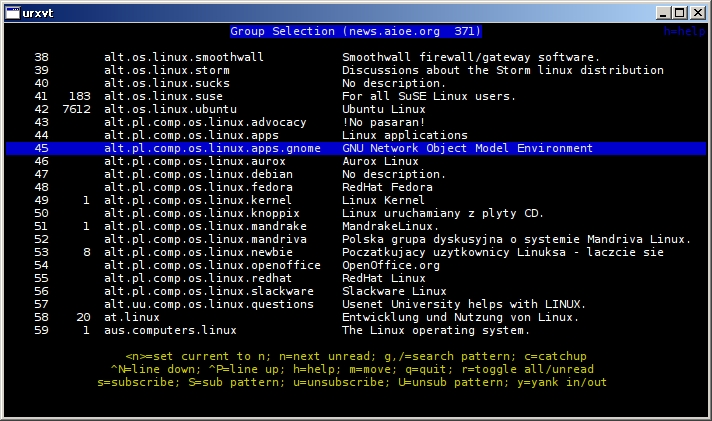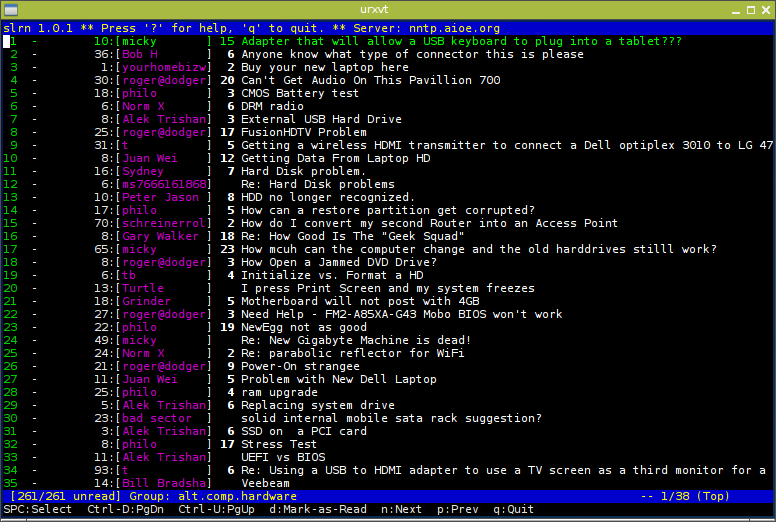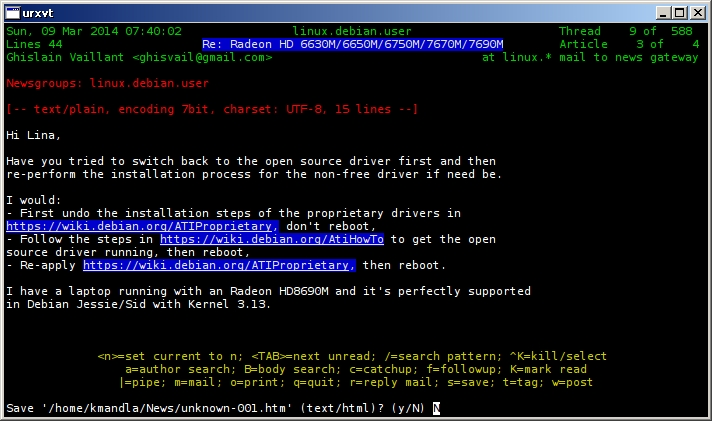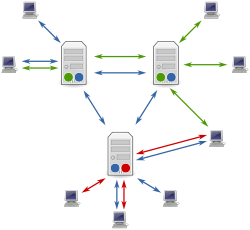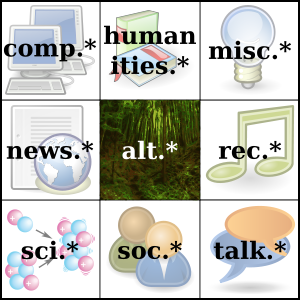Table of Contents
Usenet
. . . . Today there are great forces battling to structure and control the information superhighway, and it is invaluable that the Internet and Usenet exist as working models. Without them it would be quite easy to argue that the information superhighway should have a top-down hierarchical command and control structure. After all there are numerous working models for that. – Thomas Truscott, December 1995 in Netizens: An Anthology
위의 글은 Usenet이 한 역할에 대해서 Tom Truscott가 남긴 글이다. Usenet, newsgroup의 (위계적)인 구조와 참여방식의 개방적인 성격이 없었더라면 인포메이션 하이웨이가 위에서 아래로 조직화되는, 따라서 콘트롤이 가능한 그 무엇으로 되었을 것이라고 주장하고 있다.
Usenet은 1979년 Tom Truscott에 의해서 개발되어 90년대까지 (WWW이 세상을 덮을 때까지) 가장 활동적으로 사용되어 왔던 일종의 Message system이다. Users' network의 약자이며, 종종 사람들은 the newsgroups라고도 불렀다. UUCP를 장착한 (훗날에는 NNTP) 서버들이 Usenet server로 작동하였다. 인터넷을 통해서 연결되어 있는 상태에서, 이 서버들은 서로 메시지를 자동적으로 교환하게 되어 있다. 로컬네트워크나 인근의 네트워크를 통해서 Usenet을 사용하는 사용자들이 Newsgroup들 중의 하나를 선택하여 메시지를 남기면, 이 메시지가 ARPANET의 모든 UUCP 장착 서버에 무한 복제되도록 하여, 각 서버의 사용자들이 이를 읽을 수 있도록 (또 답글을 달 수 있도록) 하는 테크놀로지이다. 이는 어느 한 장소에 메지시가 집적되어 검열이나 조작, 제어 등이 쉽지 않도록 되었다는 것을 뜻 하며, 이를 통하여 다양한 종류의 아이디어와 생각들이 유통되게 되었다.
이 위키의 필자는 인터넷=민주주의라는 약간은 왜곡된 생각이 바로 이 테크놀로지가 폭발적으로 사용되면서 암묵적으로 퍼져 나갔다고 본다. 누구도 나의 글을 지울 수 없다라는 현상이 민주주의 보다는 테크놀로지 디자인에 기반한 것이었다. 시간이 지나면서 Usenet의 newsgroups들이 abuse를 당하게 되면서 (트래픽의 대부분이 topic에서 벗어나는 spam이나 flaming과 같은 것들로 채워지게 되면서), mod를 이용한 자발적인 메시지 중재의 시도가 있었으며, 인터넷의 상업적인 사용과 WWW의 확산으로 인해 점차 사라져 가게 된 테크놀로지라고 할 수 있다.
한국 'Naver지식인' '다움 아고라' 등이 이와 같은 역할을 하고 있다고 볼 수는 있지만, 지식인이라는 상품은 특정 서버에 메시지와 정보가 집적되어 있다는 점에서 Usenet과 전현 다른 성격을 갖는다. 따라서, 이와 같은 종류의 메시지 교환 시스템은 정보나 중앙집권적인 권력기관 등에 의해서 쉽게 통제를 받게 되는 현상이 존재한다.
그럼에도 불구하고, Naver지식인이나 다움아고라, 신문사/포털사의 댓글문화가 한국에서 비교적 자유로운 성격을 가지고 발전할 수 있었던 것은, 테크놀로지의 민주주의적인 성격에 기인한 것이 아니라, 테크놀로지의 상업적인 성격에 기인한 것이었다. 즉, 댓글문화에서 “내 글을 지우는 것”에 대한 강한 반발이 효과적이었던 이유는 포털이나 신문사등이 메시지를 콘트롤하게 되면 사용자가 떨어져 나가기 때문, 즉 사용자를 잃게 되는 것에 대한 두려움이었지, 테크놀로지가 민주주의에 기반하였기 때문은 아니었다는 점이다. 그 과정이야 어쨋든, '상업적인 굴레 혹은 테두리에서' 자유롭게 사용되던 테크놀로지는 일종의 문화적인 현상으로 폭발하기도 하는데, 이것이 오마이 뉴스의 창간, 촛불집회의 성공 등이다.
따라서 필자가 인터넷 테크놀로지와 민주주의가 왜곡된 상관관계에 있었다고 주장하더라도, 그 문화적인 현상이 출현(emerging)하게 된 것, 그리고 이것이 역사/사회적인 의미를 갖게 되는 것에는 변함이 없다.
또 한가지는 Usenet의 '참여적인 성격'이다. 당시의 메시지 시스템이 확산될 수 있었던 원동력은 사용자들의 자발적인 참여와 스스로의 교육에 의해서 가능한 것이엇다 1). FAQ이라고 불리는 Frequently Asked Questions 등은 Usenet newgroups이 다발적으로 만들어지면서 해당 newgroup의 사용자들이 자발적으로 참여해 만들어진 것이었으며, Zen and the Art of the Internet문서 등도 이와 같은 성격을 갖는 것이었다.
Terms used in the Usenet
- Breidbart Index
- Cross-post
- FAQ
- Flaming and flame war
- Flood aka flooders and flooding
- FWAK
- Godwin's Law
- It's always September See Eternal September
- kill file
- list of newsgroups
- MSTing
- scorefile
- sock puppet
- sporgery
- Trolling
- Usenet Death Penalty
- Usenet cabal
- Wackyparsing
- X-No-Archive
Some e.g.
7개로 이루어진 초기의 newgroup 구조
| Name | Sub (added later) | Sub | Purpose |
|---|---|---|---|
| comp. | This hierarchy deals with all aspects of computers. | ||
| misc. | |||
| sci. | Hierarchy for scientific newsgroups itself. | ||
| soc. | Deals with society in general. | ||
| soc.culture. | Deals with the society's culture. | ||
| soc.culture.austrian | This newsgroup deals with the Austrian society's culture. | ||
| talk. | General talk. | ||
| news. | This hierarchy deals with the news system. | ||
| rec. | Recreational hierarchy. | ||
| later added | |||
| alt. | The alternative hierarchy. Everybody is allowed to create a newsgroup within this hierarchy. | ||
| biz. | Covers business related stuff. | ||
| gnu. | Groups concentrating on interests and software with the GNU Project of the Free Software Foundation. For further info on what the FSF is, see section The Free Software Foundation. | ||
아래는 Newsgroup중의 하나인 comp.os.minix 그룹에 포스팅되었던 메시지 중의 하나이다. 저자 (From)는 torvalds라는 사람이고 이 사람은 핀란드 (FI) 의 헬싱키 (helsinki)의 klaava 라는 조직에 속해있는 사람이다. 포스팅의 주제는 minix라른 운영체제에 대해서 바라는 점이 있다면 무엇인지를 묻는 메시지이다. 부제를 보면, 자신이 개발하는 OS에 대한 작은 서베이라고 한다.
이 메시지가 Linus Torvalds가 최초로 남긴 자신이 개발 중인 Linux OS에 대한 의견을 묻는 최초의 Usenet newsgroup 메시지이다. WWW 또한 이와 같은 경로를 통해서 세상에 알려졌다 (참조: Tim's letter in Internet History).
From: torvalds@klaava.Helsinki.FI (Linus Benedict Torvalds)
Newsgroups: comp.os.minix
Subject: What would you like to see most in minix?
Summary: small poll for my new operating system
Message-ID: <1991Aug25.205708.9541@klaava.Helsinki.FI>
Date: 25 Aug 91 20:57:08 GMT
Organization: University of Helsinki
Hello everybody out there using minix -
I'm doing a (free) operating system (just a hobby, won't be big and
professional like gnu) for 386(486) AT clones. This has been brewing
since april, and is starting to get ready. I'd like any feedback on
things people like/dislike in minix, as my OS resembles it somewhat
(same physical layout of the file-system (due to practical reasons)
among other things).
I've currently ported bash(1.08) and gcc(1.40), and things seem to work.
This implies that I'll get something practical within a few months, and
I'd like to know what features most people would want. Any suggestions
are welcome, but I won't promise I'll implement them :-)
Linus (torvalds@kruuna.helsinki.fi)
PS. Yes - it's free of any minix code, and it has a multi-threaded fs.
It is NOT protable (uses 386 task switching etc), and it probably never
will support anything other than AT-harddisks, as that's all I have :-(.
Usenet newsgroup 예 한국의 OpenWeb newsgroup:
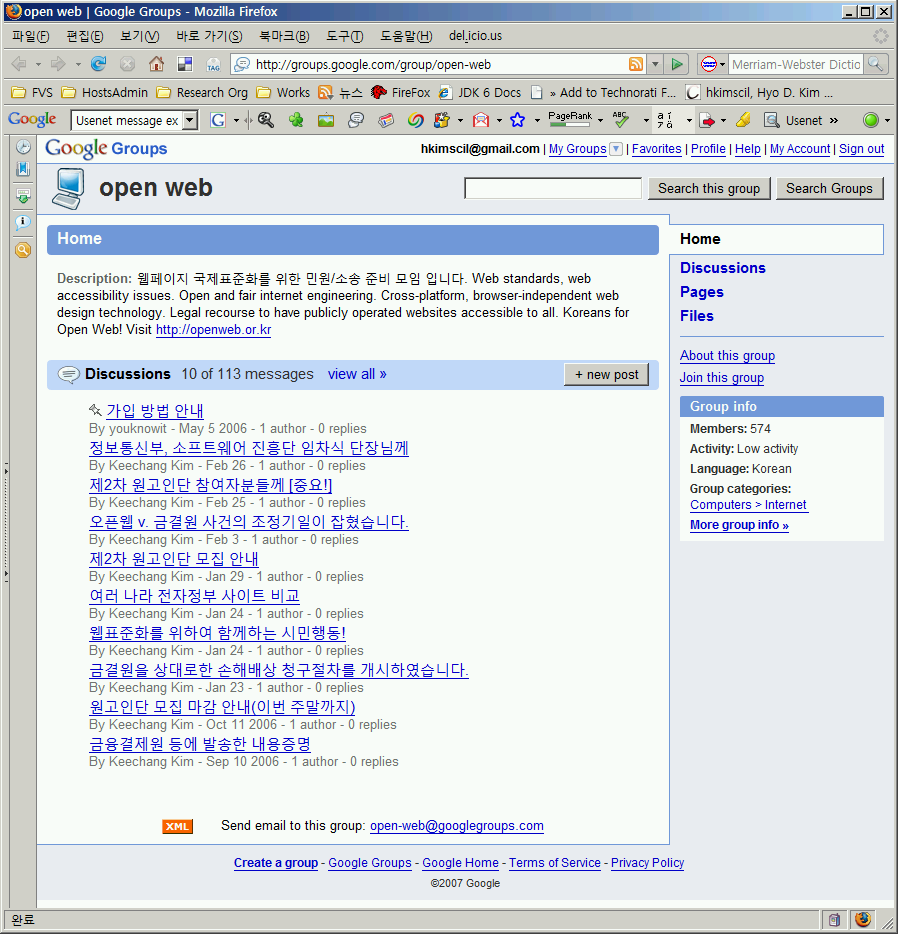
TV and usenet
Star Trek: Next Generation best scene data
Data: AI robot, https://www.youtube.com/watch?v=P-v31fL_H14
Universe: 4 Quardrants (a, b, c, d), https://youtu.be/NC9nuQ8wzSQ?t=156
- see also http://www.startrekmap.com/
Klingon
usenet startrek klingon
- Game으로도 출시됨.
Links
* About Usenet Usenet의 역사, 디자인, 사용, 발전 등에 대한 설명 2)
* Netizens: An Anthology의 아래 네 개의 장은 Usenet의 역사와 사회적 평가에 대한 기록3).
* Standard Usenet message format,

